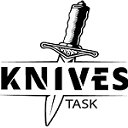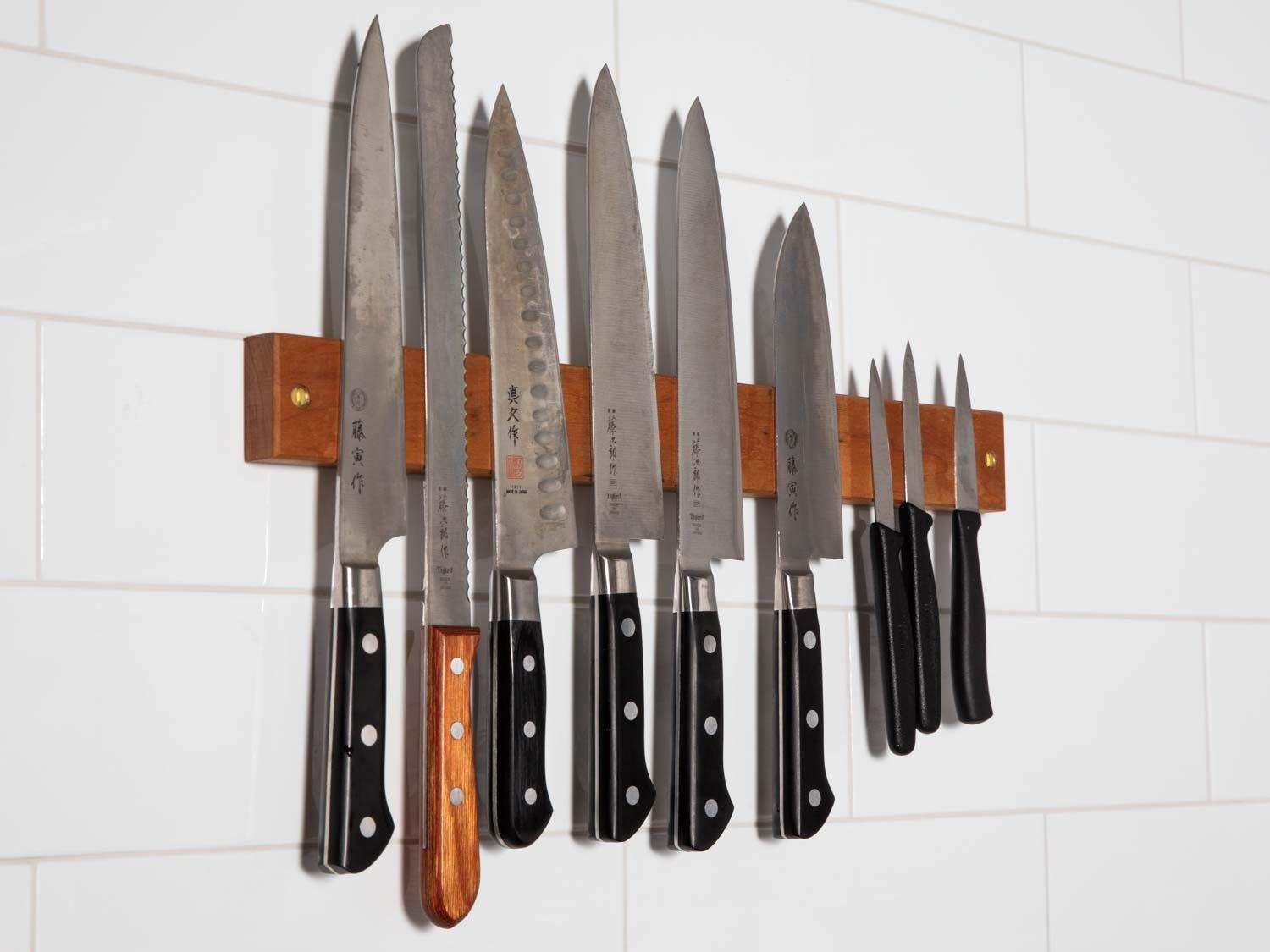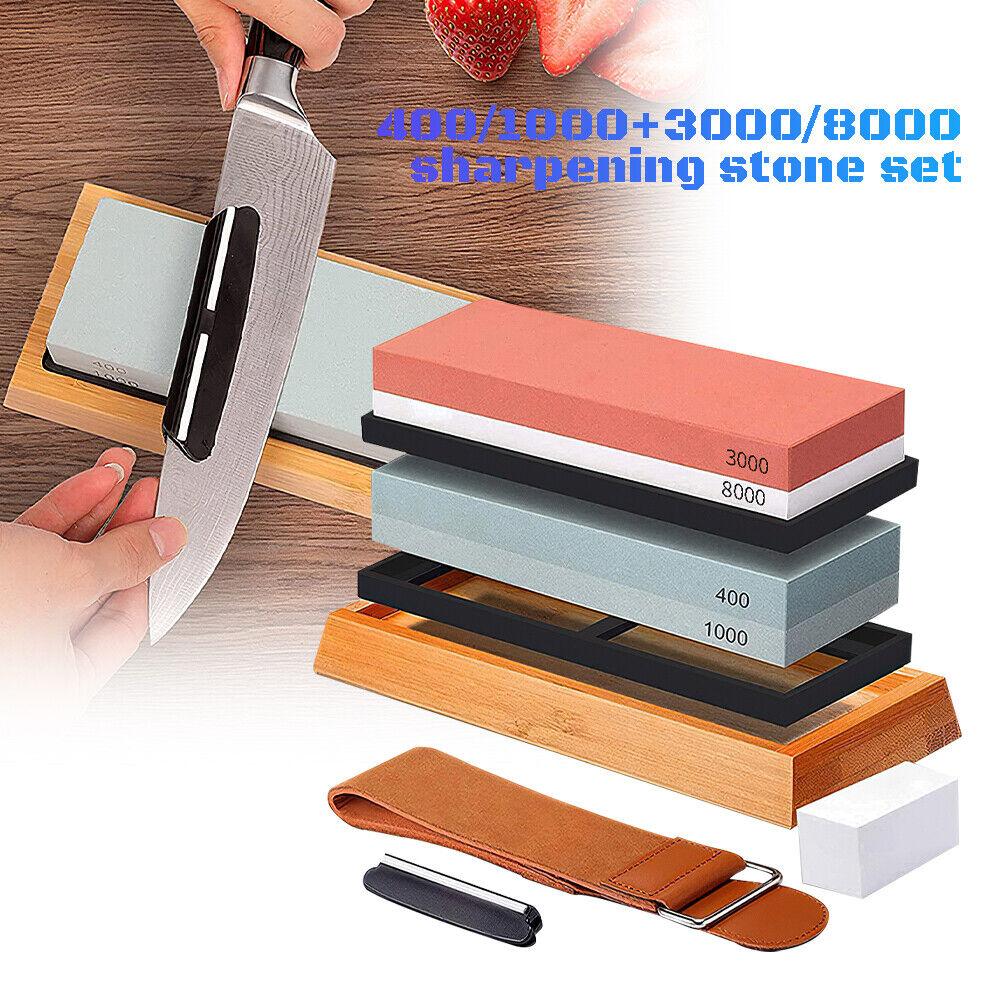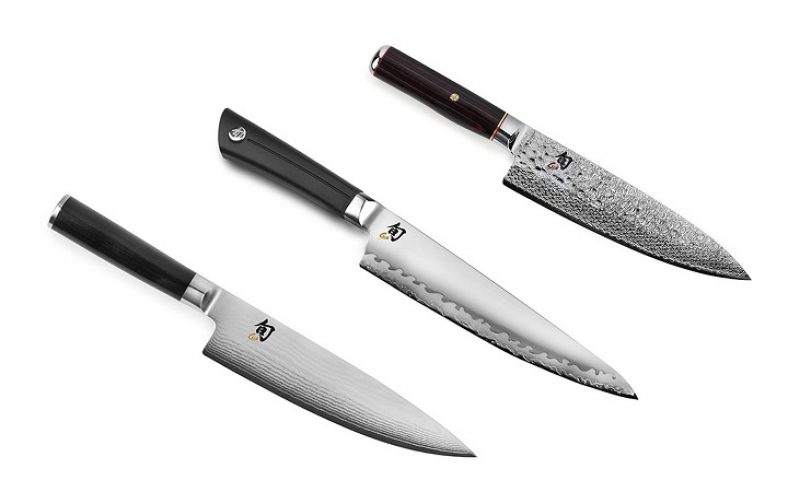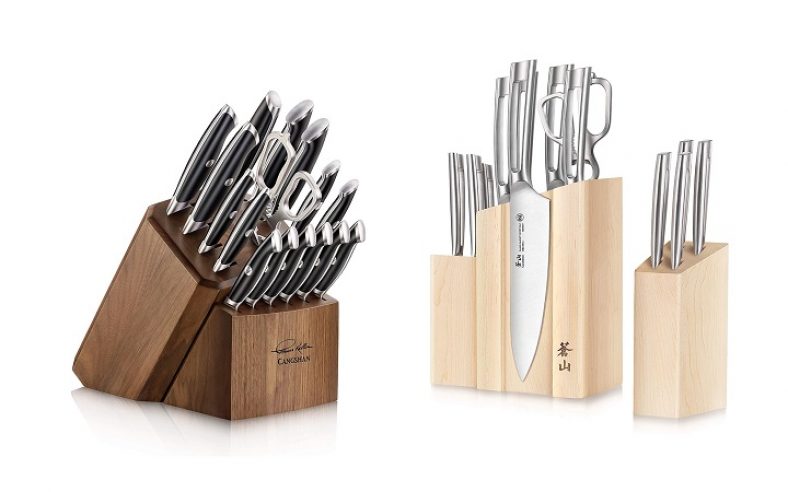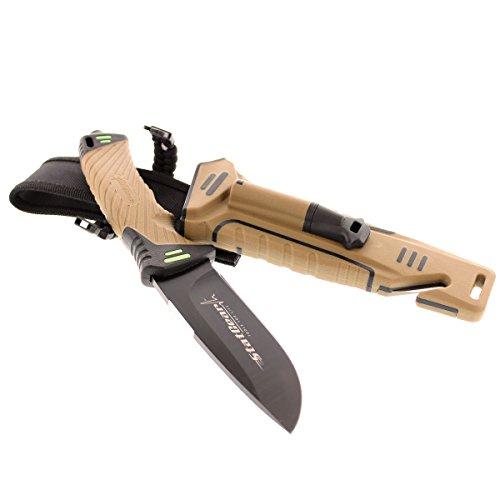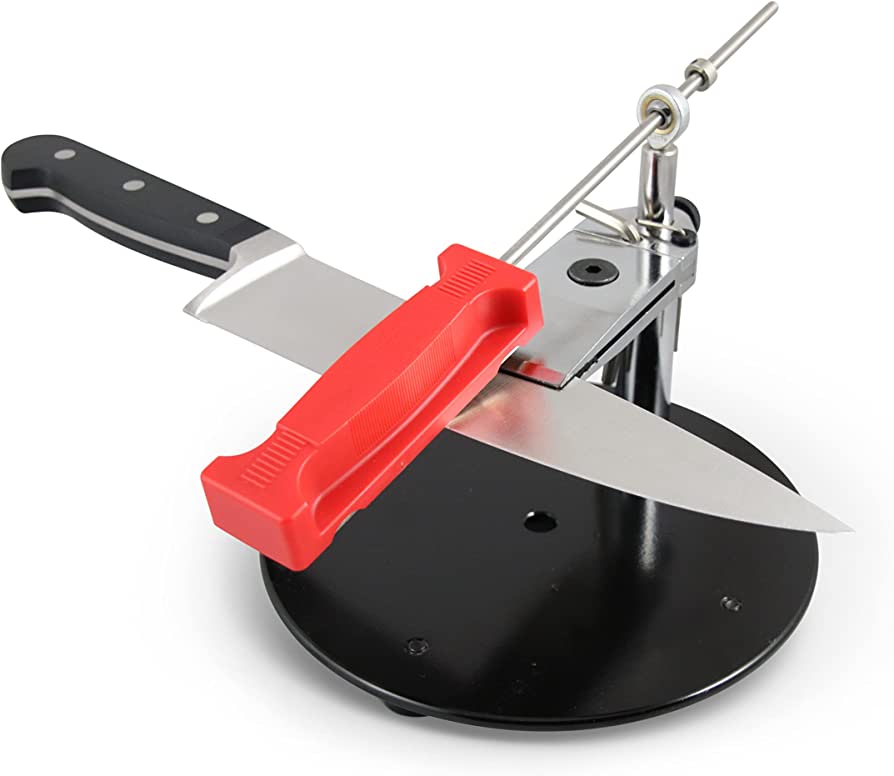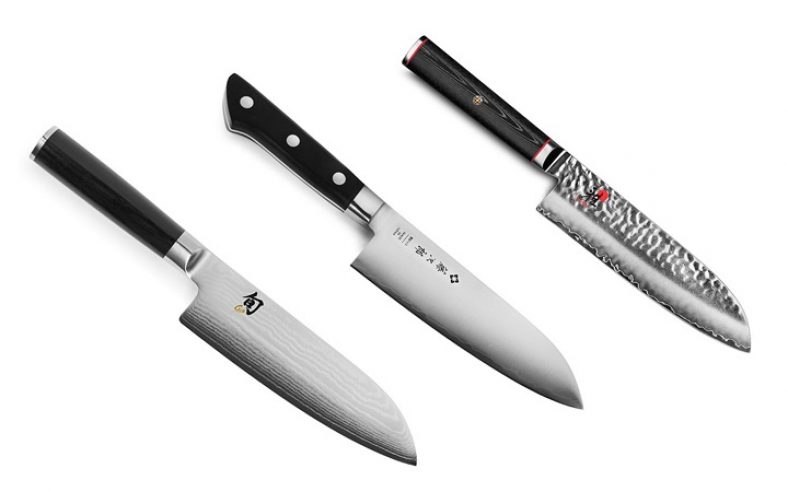To store kitchen knives, use a knife block or magnetic strip mounted on a wall. Properly storing your kitchen knives is essential to keep them sharp and your fingers safe.
Dull knives not only make your food preparation slower but are more dangerous than sharp ones because they tend to slip. Avoid the drawer where knives can easily damage each other and injure those reaching for other kitchen tools. The most popular and safest options to store knives are the knife block and magnetic strips mounted on a wall.
Knife blocks come in various shapes, sizes, and materials; the most common is wood. Magnetic strips are better for those who prefer to save space on their countertops. Regardless of your preference, both options are designed to keep the knives secure, accessible, and in excellent condition for whenever you need them.
:max_bytes(150000):strip_icc()/GettyImages-1450792958-edc2bccefc0f4f6ba79dbe21452529b9.jpg)
Credit: www.thespruce.com
The Risks Of Improper Knife Storage
Storing kitchen knives may seem like a straightforward task, but improper storage can lead to potential hazards. Let’s explore some of the risks associated with improper knife storage.
Common Mistakes In Storing Knives
- Storing knives in drawers or containers without proper slots or sheaths can damage the blades and dull their sharpness.
- Leaving knives lying around on countertops, tables, or anywhere else can pose risk to anyone who accidentally bumps into them.
- Placing knives in a dishwasher can damage their blades, leading to an uneven edge or rusting.
- Storing knives with other utensils like forks or spoons can cause scratches on the blades, leading to corrosion and dullness.
The Risks Of Each Type Of Improper Storage
- Storing knives in overcrowded drawers or containers can lead to accidental cuts and injuries when trying to reach for them.
- Leaving knives lying around can result in injuries, especially for children who may accidentally pick them up.
- Placing knives in a dishwasher can cause damage to their blades and shorten their lifespan.
- Storing knives with other utensils can cause corrosion and dullness, leading to difficulty in chopping and cutting.
Potential Damage To The Knives And Danger To The User
Improper storage of knives can lead to potential damage to the blades and pose a danger to the user.
- Dulling of the blades: Storing knives improperly can cause the blades to rub against surfaces, leading to dullness and inefficiency in cutting and chopping.
- Uneven edges: Placing knives in a dishwasher can cause warping, leading to an uneven edge, making it difficult to achieve precise cuts.
- Rusting: Exposure to moisture can cause rusting, which can weaken the blades and lead to deterioration, affecting their quality.
- Danger to the user: Leaving knives lying around or storing them in overcrowded drawers can lead to potential accidents and injuries.
Proper storage of kitchen knives is crucial for their longevity and user safety. By avoiding the common mistakes and understanding the risks associated with improper storage, you can ensure that your knives remain sharp and efficient for years to come.
The Dos Of Knife Storage
Choose The Right Storage Method For Your Knives
When it comes to storing kitchen knives, there are a number of factors to consider. To ensure the longevity of your knives, here are some dos of knife storage:
- Choose a storage method that suits your needs. Consider the size of your kitchen and how often you use your knives. Some common storage solutions include magnetic strips, knife blocks, in-drawer organizers, and knife rolls.
- Consider the material your knives are made of before choosing a storage method. For example, knives with carbon steel blades should not be stored in a damp environment, so a magnetic strip might not be the best option for those types of knives.
- Make sure the storage method you choose holds your knives securely and doesn’t damage the blades or handles. A good storage solution should also be easy to clean and maintain.
How To Maintain Knife Cleanliness Before Storage
Proper cleaning and maintenance are key to ensuring your kitchen knives remain sharp and in good condition for a long time. Here are some tips for maintaining knife cleanliness before storage:
- Wash your knives by hand using warm water and dish soap. Avoid soaking them in water or putting them in the dishwasher.
- Dry your knives thoroughly with a clean towel to prevent rust or corrosion from forming on the blades.
- Use a honing steel to keep your knives sharp. This should be done regularly, ideally after each use. A dull knife is more dangerous than a sharp one because you have to use more force to cut, which increases the risk of injury.
- Oil your knives occasionally to prevent them from rusting and to keep them in top condition.
How To Properly Store Knives To Prevent Damage
To prevent your kitchen knives from becoming damaged during storage, follow these best practices:
- Always store your knives in a designated storage area, such as a knife block, or on a magnetic strip. Never leave them lying around in drawers or on countertops.
- If you’re storing your knives in a drawer, use a knife block or in-drawer organizer to keep them organized and prevent them from jostling around.
- Keep the blades of your knives protected by using blade guards or sheaths. These are especially important if you’re storing your knives in a drawer or transporting them.
- Keep your knives out of reach of children or pets to prevent accidents.
Creative Ways To Store Knives
If you’re looking for a creative way to store your kitchen knives, here are some ideas:
- Install a magnetic strip on the inside of a cabinet or on the backsplash for a sleek, modern look.
- Use a knife block made from bamboo or another eco-friendly material to add a rustic touch to your kitchen.
- Repurpose a wooden cigar box or other similar container for a unique knife storage solution.
- Consider a knife roll for chefs who need to transport their knives between kitchens.
Remember, the key to storing your knives properly is to choose a storage method that works for you, keep them clean and sharp, and protect the blades during storage. By following these tips, your kitchen knives will serve you well for years to come.
The Don’Ts Of Knife Storage
Storing kitchen knives may seem like a simple task, but failure to store them correctly can lead to serious consequences, including accidents, injuries, and damage to the knives. In this blog post, we will discuss the don’ts of knife storage.
Common Mistakes To Avoid In Knife Storage
Below are the common mistakes to avoid in knife storage:
- Leaving knives in a drawer: Many people store their kitchen knives in a drawer for convenience. However, this is a dangerous practice as the knives can easily become damaged, and they can also be difficult to retrieve.
- Storing knives improperly: Storing knives improperly can cause them to become dull, damaged, or even rusted.
- Mishandling knives: Improper handling of knives can lead to injuries. It’s important to handle knives with care to avoid accidents.
Why Each Mistake Is Harmful
Here are the reasons why the above mistakes are harmful:
- Leaving knives in a drawer: As knives move around in the drawer, they can become dull and damaged. It’s also easy to cut yourself while reaching for a knife in the drawer.
- Storing knives improperly: Storing knives improperly can cause them to become dull or even rusted, which can lead to damage and a short lifespan for the knives.
- Mishandling knives: Mishandling knives can result in serious injuries, including cuts and puncture wounds. Treating knives with respect is the best way to avoid accidents.
How To Prevent These Mistakes And Their Consequences
You can prevent these mistakes and their consequences with a few simple steps:
- Use a knife block: A knife block is an excellent way to keep your knives organized and easily accessible. It’s also a safe way to store knives, as they’re stored blade up.
- Use a magnetic strip: A magnetic strip is a space-saving option for knife storage. It keeps knives off the counter while also keeping them easily accessible.
- Handle knives with care: When using knives, always handle them with care. Cut away from your body and keep the blade sharp to make cuts easier and reduce the risk of accidents.
The don’ts of knife storage are easy to avoid as long as you have the right storage options in place and treat your knives with care. By using a knife block or magnetic strip and handling your knives with care, you can keep them in top condition and avoid accidents.
Keeping Your Knives Clean And Sharp
Storing kitchen knives properly is essential to ensure they are always efficient and safe to use. However, keeping your knives clean and sharp is equally important, to prolong their lifespan and prevent damage or potential injuries. In this blog post, we will discuss the best techniques to clean your knives, how to safely sharpen them, and how to maintain their sharpness.
Best Cleaning Techniques For Knives:
Keeping your kitchen knives clean is not only hygienic but also helps prevent corrosion and rust. Here are some of the best cleaning techniques to follow:
- Hand washing: Always wash your knives by hand using mild soap and warm water. Dishwashers can dull or pit the blade’s edges, diminish the finish, and promote rust.
- Regular cleaning: Try to clean your knives as soon as possible after use. Food residue can corrode and discolor the blade if left for too long.
- Dry your knives properly: Dry your knives thoroughly after washing, using a soft towel or cloth. Avoid using abrasive sponges or brushes that may scratch the blade.
- Oil the blade if necessary: Some types of knives require oiling to prevent rust. Always follow the manufacturer’s recommendations when oiling your knives.
How To Safely Sharpen Knives:
Dull knives can be dangerous as they require more force to cut, and can slip or bounce off food and cause injuries. Sharpening your knives is crucial to ensure your knives are always in peak condition. Here are some tips to follow:
- Use a sharpening stone: A sharpening stone can help restore the sharpness of your blade. Make sure to follow the manufacturer’s instructions and use the correct angle when sharpening your knife.
- Utilize honing steel: A honing steel sharpens your knife without removing any metal. Hold the steel in your non-dominant hand, then hold the knife against the steel at a 20-degree angle and slide it down the length of the blade.
- Choose the right angle: Always sharpen your knives at the correct angle. A 20-degree angle is ideal for most kitchen knives, but consult the manufacturer’s recommendations if you’re unsure.
How To Maintain Knife Sharpness:
Maintaining your knife sharpness is essential to ensure they are always efficient and safe to use. Here are some tips for maintaining your knife sharpness:
- Store your knives properly: Keeping them in a knife block or wall-mounted magnet is ideal. Avoid placing them in drawers or stacking them, as this can dull the blades.
- Use cutting boards correctly: Always use a cutting board when slicing or chopping food. Avoid using glass, metal, or ceramic cutting boards, as they can dull your knives.
- Use your knives only for their intended purpose: Don’t use your knives to cut anything other than food products, as this can cause them to dull faster.
- Regular honing: Honing your knives regularly between sharpening sessions can help maintain their sharpness. It also helps remove any small dings or nicks in the blade.
Maintaining your knives can extend their lifespan and keeps them safe to use. By following these tips, you can keep your knives in good condition and happier in your kitchen.
Frequently Asked Questions For How To Store Kitchen Knives
How Do You Properly Store Kitchen Knives?
To store a kitchen knife properly, always keep the blades dry, keep them in a knife block, or on a magnetic strip. Never store the kitchen knives in a drawer because the blades may get damaged.
How Do You Sharpen A Kitchen Knife?
To sharpen a kitchen knife, you will need a sharpening stone, set the correct angle, and use a lubricant to sharpen every side of the blade. After that, hone the blade to remove any burrs and wipe the blade clean.
How Often Should You Sharpen Kitchen Knives?
Sharpening kitchen knives would depend on how much you use them. Generally, a home cook would sharpen their kitchen knives every six months, and a professional chef would sharpen their knives every month.
What Are The Best Materials For Knife Storage?
The best materials for knife storage would be a knife block, magnetic strip, and a blade guard. A knife block is great for people who don’t have a lot of storage space. Magnetic strips are perfect for showcasing your knives, and blade guards protect the blade when they are in storage.
Can You Put Kitchen Knives In The Dishwasher?
It’s not recommended to put your kitchen knives in the dishwasher as it can damage the blades. The high heat and moisture can cause the blade to corrode or become dull, so it’s best to handwash the knives to keep them in good condition.
Conclusion
Proper storage of kitchen knives is crucial not just for the longevity of the knives but also for the safety of the individuals using them. Keeping your kitchen knives in an organized and secure manner can prevent cutting accidents in the kitchen.
We have discussed several methods for knife storage, each with its own benefits and drawbacks. Magnetic strips can be used to showcase your knives and keep them within easy reach, while knife blocks can separate and protect each individual knife.
Drawer inserts can save counter space and protect blades from damage. Whatever method you choose, it is important to keep your knives clean and dry before storing them. By following these tips and guidelines, you can ensure your knives remain safe, sharp, and functional for many years to come.
